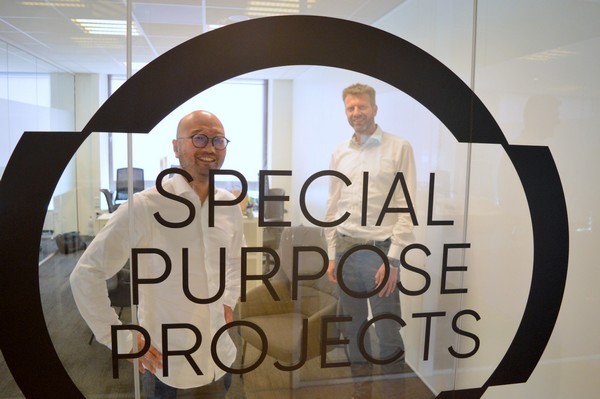Entrepreneurial venture grows in Dutch greenhouse horticulture
posted in hortidaily on oct 27
From the high rise office tower in Rotterdam, Special Purpose Projects has been overlooking (part of) its working area since June. Since 2019, the Dutch entrepreneurial club has been working intensively with various international horticultural (engineering and development) companies, some of which one could point at from afar, so to speak.
Rutger Mans and Matthijs Visser are the Managing Directors of the company and they are convinced that there are still a lot of companies with the potential to grow (again). “‘We would like to help them with that, preferably as co-entrepeneurs. That’s how we stand out,” Rutger explains enthusiastically.
Matthijs Visser and Rutger Mans look out over the Westland from the tenth floor of the office tower in Rotterdam where they are based.
Co-entrepreneurship
The managing partner previously gained experience as an operations manager and strategy and transformation consultant, which comes in handy now that he is an entrepreneur pursuing growth together with other entrepreneurs. He started the business with Matthijs, who himself set up a corporate venture in the energy sector and has many years of experience with mergers and acquisitions.
“When discussing growth for a company we often hear entrepreneurs say ‘We’ve tried a lot, but it didn’t work.’ In our experience, we learned that either the idea or the approach wasn’t good; often it is the latter or a combination of the two. It is precisely with this approach that we help entrepreneurs. You may see us as consultants, but there are big differences in both our way of working and the collaboration form. Developing ideas for renewed growth is a creative process where we formulate opportunities; however, it is often not so simple to turn opportunities into results. Consultants often move on when the idea is formulated and it is up to the entrepreneur to translate that advice into actions and results. We believe in working together to make a success out of those opportunities.”
That is why co-entrepreneurship is the best option, according to Special Purpose Projects. “That way, both parties bear the risks and both benefit from the growth. We are also active and involved in the years of execution to turn the plans into a reality. This makes us investors too, only in a different way,” says Rutger.
Making an impact
This co-entrepreneurship can take place in various ways. “We prefer to do that by participating in a company with a minority or majority share, but we might as well develop a new product together to help a company grow. Growth is always our starting point. We don’t just want to improve companies operationally, but also make an impact with a good growth plan,” says Matthijs.
‘Making an impact’ is eminently possible in greenhouse farming, according to Rutger. “We see a lot of potential in this sector, so we are strongly focused on it. We work for all kinds of SME’s. We do not necessarily focus on the top of the market, but rather on the broad layer of companies below it.
If you walk across any business area you will find many large and smaller companies. Behind all those doors are entrepreneurs who often deal with fundamental questions: What will be my position in a changing and consolidating market? Am I going to participate? Or am I not? How long do I want to continue with my company? Where do I find the right people? Do I want to collaborate? Or merge? And which markets will I focus on? These are all questions we want to help entrepreneurs find answers to.”
Organizing for (re)new(ed) growth
The implementation of good ideas requires more than a good plan. For instance, Special Purpose Projects has noticed that companies in the greenhouse horticulture sector are often still very much dependent one single entrepreneur or manager. As a result of their organizational structure, sooner or later these companies find their limits. “We often see that this is an obstacle to their future,” says Matthijs.
Rutger cites an example of a company in which Special Purpose Projects became involved, a company that had a lot of new projects in the pipeline. At that time, an executive left and the successor did not have the right organizational experience. The ERP system needed to be updated and a Lean working method had to be implemented in the execution of the projects. Because of the renewed organization, the company now knows how to increase its added value for customers and achieve growth.”
Matthijs has another example. “At another company, the customer wanted to pursue the opportunity to grow in new fields which required the development of knowledge first. To that end, we arranged collaborations with knowledge partners and were thus able to serve the customer well together.”

Getting involved
Special Purpose Projects prefers to participate actively in companies. “That way, we also share the risks and are really involved. By working together, you combine the knowledge and experience that everyone brings,” says Rutger.
Matthijs adds that “it can sometimes help to bring in outsiders with some distance from the subject matter, to look at things from a different perspective. People who, for example, dare to ask whether the neighbor is really your competitor. After all, could you not collaborate to get further together? I think the tomato growers at Dutch cooperation Prominent are a good example of this. They really created something new together, making sure it’s no longer every man for himself, and they have tapped into new markets as a result.”
The desire to participate in a company raises the question whether there are limits to what the Rotterdam-based company can do. Rutger has no doubts about this. “The starting point is to come up with new good ideas for growth. If business plans are good enough, we don’t see a lack of funds. We have financial possibilities to invest ourselves and a network with investors who can join in where necessary.” Matthijs adds that “we apply the same approach for our companies as for ourselves.”
Special Purpose Projects expects to steadily expand the number of companies in which it co-invests. Selling companies is also an option. “That depends entirely on the desire of an entrepreneur. If they want to stop after achieving one more success, then we will create a plan and we work together to ensure that the company is ready to be taken over after a certain point in time. We make companies stable and ready for future growth,” says Matthijs.
For more information:
Rutger Mans
Matthijs Visser
Special Purpose Projects
info@specialpurposeprojects.com
www.specialpurposeprojects.com
Publication date: Wed 27 Oct 2021
